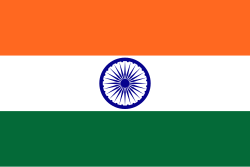Non-resident Indian and person of Indian origin

|
|
| Total population | |
|---|---|
| c. 30.8 million (December 2016) | |
| Regions with significant populations | |
|
|
4,460,000 |
|
|
3,053,567 |
|
|
2,986,274 |
|
|
2,803,751 |
|
|
2,008,337 |
|
|
1,825,000 |
|
|
1,560,000 |
|
|
1,614,000 |
|
|
1,016,185 |
|
|
923,260 |
|
|
894,500 |
|
|
796,001 |
|
|
650,000 |
|
|
600,000 |
|
|
600,000 |
|
|
556,800 |
| Languages | |
| Languages of India and various languages of the countries they inhabit | |
| Religion | |
|
Predominantly: Hinduism Minorities: |
|
| Related ethnic groups | |
| Indian people | |
A Non-Resident Indian (NRI) is a citizen of India who holds an Indian passport and has temporarily emigrated to another country for six months or more for employment, residence, education or any other purpose.
A Person of Indian Origin (PIO) is a person of Indian origin or ancestry but who is not a citizen of India and is the citizen of another country. A PIO might have been a citizen of India and subsequently taken the citizenship of another country, or have ancestors born in India or other states.
Other terms with vaguely the same meaning are overseas Indian and expatriate Indian. In common usage, this often includes India-born individuals (and peoples of other nations with Indian ancestry) who have taken the citizenship of other countries.
According to a survey conducted by UN department of economic and social affairs, India has the largest diaspora population in the world.
Strictly speaking, the term non-resident refers only to the tax status of a person who, as per section 6 of the Income-tax Act of 1961, has not resided in India for a specified period for the purposes of the Income Tax Act. The rates of income tax are different for persons who are "resident in India" and for NRIs. For the purposes of the Income Tax Act, "residence in India" requires stay in India of at least 182 days in a calendar year or 365 days spread out over four consecutive years. According to the act, any Indian citizen who does not meet the criteria as a "resident of India" is a non-resident of India and is treated as NRI for paying income tax.
Government of India considers anyone of Indian origin up to four generations removed to be a PIO, with the exception of those who were ever nationals of Afghanistan, Bangladesh, Bhutan, Nepal, Pakistan, or Sri Lanka. The prohibited list periodically includes China and Iran as well. The government issues a PIO Card to a PIO after verification of his or her origin or ancestry and this card entitles a PIO to enter India without a visa. The spouse of a PIO can also be issued a PIO card though the spouse might not be a PIO. This latter category includes foreign spouses of Indian nationals, regardless of ethnic origin, so long as they were not born in, or ever nationals of, the aforementioned prohibited countries. PIO Cards exempt holders from many restrictions that apply to foreign nationals, such as visa and work permit requirements, along with certain other economic limitations.
...
Wikipedia
